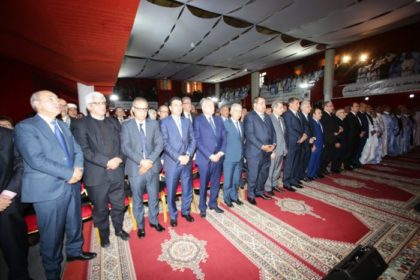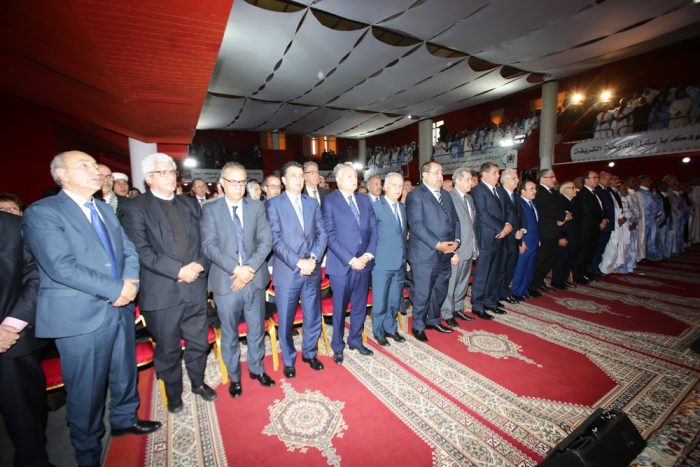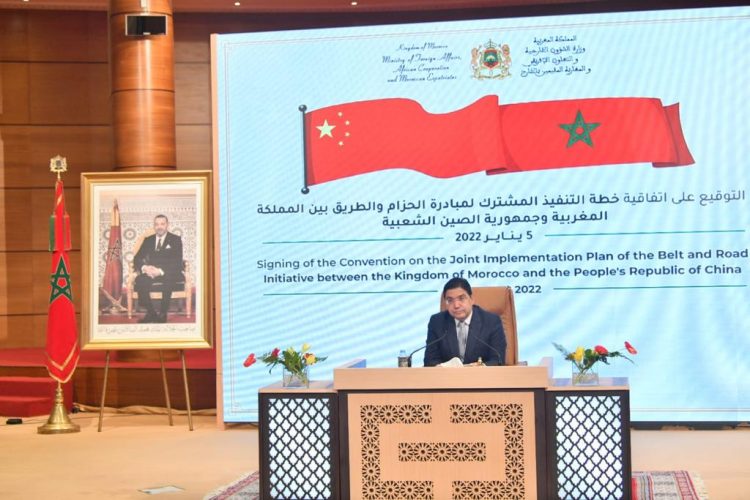 Moroccan political parties from across the spectrum and even parties that are not represented at the Parliament held a huge national mobilization meeting in Laayoune, Chief city of the Sahara provinces, Monday to show the world that the country is united and steadfast to counter the latest provocations of the Polisario Front and to defend the country’s territorial integrity.
Moroccan political parties from across the spectrum and even parties that are not represented at the Parliament held a huge national mobilization meeting in Laayoune, Chief city of the Sahara provinces, Monday to show the world that the country is united and steadfast to counter the latest provocations of the Polisario Front and to defend the country’s territorial integrity.
The rally, attended by Leaders of political parties, MPs, elected officials, Chioukhs, Sahrawi dignitaries and activists, was crowned by the adoption of the Laayoune Declaration on Monday.
“The purpose of this meeting is to convey a message at home and abroad: we are all mobilized to defend Morocco’s sovereignty and territorial integrity, as a united front under the leadership of the King,” said head of Government Saad-Eddine El Othmani, who was attending the meeting as leader of the ruling PJD party.
“The recurrent provocations of the Polisario separatists in the buffer zone have mobilized the entire nation. Morocco is determined to put an end to any violation of the ceasefire agreement signed in 1991,” Saâd-Eddine El Othmani said, warning that “the situation is very serious and can lead to serious and dangerous consequences”.
Lately, the Algeria-backed Polisario separatist front made repeated incursions in the buffer zone, east of Morocco’s security wall. The demilitarized buffer area was handed by Morocco to the MINURSO, entrusted with monitoring the ceasefire, under the UN-brokered agreements of 1991.
The separatist front revealed plans to transfer its military staff to the demilitarized zones and started mounting tents and deploying military equipment including in Tifariti, Bir Lahlou and Mahbes, in the buffer zone.
“The separatists’ provocations are serious and our country is ready to use every possible means to thwart them. We are aware of the seriousness of the situation,” the PJD leader said in his strong-worded address.
The very holding of this meeting in Laayoune is a proof in itself that Morocco will not let the Algeria-paid mercenaries have a free hand in the demilitarized zones, Othmani said.
For the leader of the PJD, the nation, in a common front, will oppose any attempt to change the status quo in the buffer zone. He reaffirmed that the national cause is not only that of the State and the Government. It is the cause of the whole people and all its components. “The Moroccan people unanimously tells the international community that we are united, that we defend a common cause,” said Saad El Othmani.
The PJD leader, who paid special tribute to the Sahrawi tribal leaders, concluded saying “we shall win”.
Leaders of the various political parties, local elected officials, tribal chiefs and regional leaders followed one another on the podium for nearly three hours. They all renewed allegiance to King Mohammed VI, denounced the threats and provocations of the Polisario Front and called the United Nations to enforce respect of the ceasefire signed in 1991.
The four-page Laayoune Declaration was then read out and signed.
The text summarizes the position of the Moroccan political class, which condemns “the maneuvers of the opponents of our territorial integrity at all levels, especially the latest hostile acts of the Polisario aimed at establishing a new reality on the ground”. The Declaration denounces in this connection the Polisario’s attempt “to transfer certain of its civilian and military elements from Lahmada in Algeria to the buffer zone, with the support of Algiers, in blatant violation of the ceasefire agreement and obvious disregard of the will of the United Nations and the Security Council resolution”.
The Declaration also denounces “the stubbornness of the Algerian regime, which persists in creating arguments and pretexts to perpetuate this artificial tension.”
The text on the other hand calls on the United Nations Mission for the Referendum in the Sahara (MINURSO), and through it the international community, to take “firm, rigorous and dissuasive measures to compel the Polisario to withdraw from this (Buffer) zone and put an end to its attempts to establish a new reality in this area.”
King Mohammed VI last week addressed a written message to UN Secretary General Antonio Guterres, renewing Morocco’s rejection of the incursions of the Polisario in the Sahara buffer zone, mainly in Bir Lahlou and Tifariti, describing these incursions as “provocative” and “unacceptable”.



